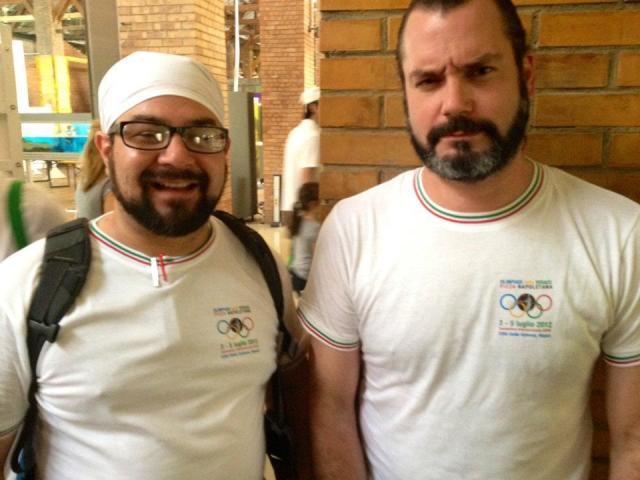Bake Off: Tutta Bella at the First-Ever Pizza Olympics

No leotards at these Olympics: Brian Gojdics and Michael Cisneros suit up in Naples. Photo via Tutta Bella's Facebook page.
Shortly before the 2012 Summer Olympics descended upon London, Tutta Bella executive chef Brian Gojdics and the Issaquah branch's kitchen manager, Michael Cisneros, found themselves on a plane to Naples. They were destined for an Olympic battle of their own. The Associazione Verace Pizza Napoletana, or VPN, the organization that certifies the authenticity of the region's signature thin-crust pizza, was holding its first-ever Olimpiadi della Verace Pizza Napoletana. The event drew chefs from all over Italy and places like Serbia, Mexico, Austria, and Russia, as well as a fearsome Japanese delegation. Gojdics and Cisneros made up half of Team USA.
After the ceremonial torch- and oven-lighting, chefs prepared for five pizza events: classic marinara or margherita, anything-goes freestyle, fried, pizza sculpture, and a competition for making pizza mastunicola, a 400-year-old lardo-and-herb-topped pizza that predates the introduction of the tomato.
While competitors mixed and tossed dough by hand, proctors roamed the rooms monitoring the ingredients and techniques, and whisked thefinished product to sequestered quarters, where some of Naples' most esteemed pizzaioli awaited in judgement.
Those same Neapolitan titans also offer training. Cisneros discovered he had been stretching dough when, instead, slapping it over an outstretched palm yields a more uniform thickness and knocks excess flour from the dough's skin. This helps deliver the crust's sought-after punch, pliant interor, and edges puffed up by air bubbles.
This maniacal level of detail might seem foreign to anyone whose pizza interludes usually involve 2am slices or a delivery guy. But much like Champagne in France or Italian proscuitto di Parma, Neapolitan pizza has its own government-devined designation of origin, identifying pizzerias that accurately reflect the town where pizza was born. The inaugural Olympics is part of the VPN's recent efforts to raise Neapolitan pizza's international profile. "The name has been used and abused all the way around, and people are getting confused," says Peppe Miele, president of VPN Americas.
Roughly 60 restaurants in the U.S. have earned VPN certification. In Washington, Tutta Bella's four locations, as well as the sprawling Ristorante Piccolinos in Ballard, and Rainier Avenue's magnificent Pizzeria Pulcinella are all certifed.
Seattle's current pizza landscape is wildly different than when owner Joe Fugere opened Tutta Bella in Columbia City in 2004; New York, not Naples, inspired most local pizza places, and VPN stipulations about how flour is mixed and pies are fired added extra cost and effort for a new business. "I thought, am I stupid?" recalls Fugere. "Maybe there's a reason why there aren't a bunch of true VPN pizzeria around here."
Today Seattle's gas-oven sliceries coexist with plenty of seasonal, wood-fired spots like Delancey or Bar Del Corso. They might not hew to the many technicalities of VPN certification, but they do embrace the Neapolitan spirit of restrained ingredients and magnificent crusts.
The pizza Olympics is set to be an annual event, rotating among countries. Not surprisingly, Italian pizzaioli took home more than half of the towering silver trophies. Japan won two gold medals, a silver, and two bronzes. Gojdics and Cisneros lost out on the medal count to their two American counterparts, but team Tutta Bella is already forming next year's battle plan.




